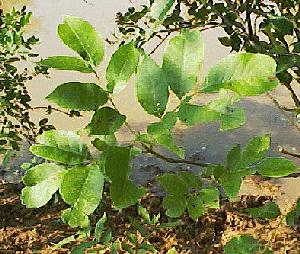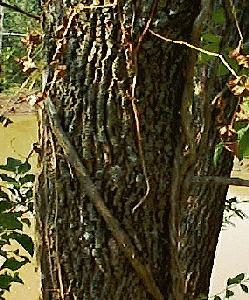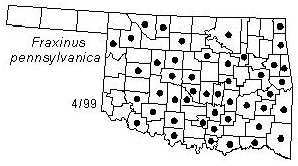

Tree to 20 m (65 ft) tall and 60 cm (2 ft) diameter with dense crown. Bark gray-brown, divided into narrow scaly ridges, with reddish-brown inner layer. Twigs gray, thick, with raised leaf scars nearly straight across the top. Buds rounded, reddish-brown, finely hairy, slightly above the leaf base or scar. Leaves opposite, pinnately compound, 15-20 cm (6-8 in) long. Leaflets usually 7 (5-9), short-stalked, lanceolate or ovate, acuminate, usually toothed but sometimes entire, 5-13 cm (2-5 in) long and 2.5-4 cm (1-1.6 in) wide, glabrous shiny green above, paler and usually slightly hairy below. Flowers very small, numerous, green, in small branching clusters on twigs in early spring. Fruits samaras hanging in clusters, 3-5 cm (1.2-2 in) long, with narrow wing extending nearly to the base of the narrow body.
Distribution: Native to about the eastern half of the U. S. and adjacent southern Canada.
Habitat: Usually in floodplain forests and in moist soil.
NWI status: FACW-
Comment: The lumber is very similar to white ash and is marketed as such. Fraxinus is the old Latin name for a species of European ash; pennsylvanica refers to Pennsylvania.
Distribution in Oklahoma: 
BACK
NEXT
RETURN TO INDEX
Last update: 9/10/99
 Go to Oklahoma Biological Survey Home Page
Go to Oklahoma Biological Survey Home Page
 Disclaimer
Disclaimer